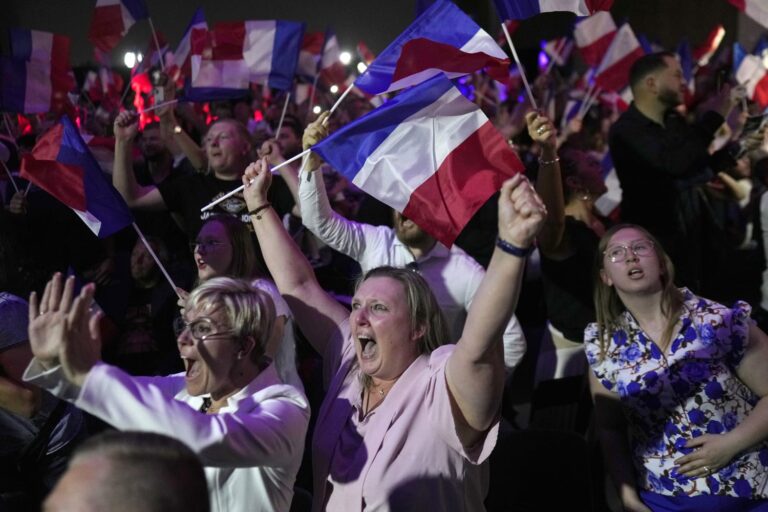PARIS — The political earthquake that France woke up to Monday was no less seismic because it may have been predictable.
The far-right swept to victory in the first round of legislative elections after President Emmanuel Macron’s almighty gamble backfired. Now the centrist leader and the country’s left, reeling from the historic results, were scrambling to thwart the National Rally (RN) in the decisive second round and prevent France’s first far-right government since the Nazi occupation in World War Two.
According to official results released by the country’s interior ministry early Monday, Marine Le Pen’s party and allies led the way with 33% of the vote, a bloc of left-wing parties followed in second with 28% and Macron’s centrist alliance trailed in third with just 20%.
Turnout was unusually high, adding to the sense of volatility. Nearly 60% voted, compared to 39,4% in 2022, according to the latest turnout numbers released by the interior ministry.
The results largely tracked opinion polls released ahead of the snap vote, called by Macron after his party took a beating from the RN in European Parliament elections last month.
But it was a clear rebuke all the same for the president and his governing party.
“The lesson is that the extreme right is at the gates of power,” Macron’s prime minister, Gabriel Attal, said in an address to the nation as the results became clear Sunday night.
The question now is whether the left and center blocs will be able to form tactical alliances to block the RN in the final runoff votes, which takes place across the country July 7.
“The situation is clear,” Attal said. “The stakes of the second round is to prevent the far right from having an absolute majority.”
The left-wing alliance, the New Popular Front, also said it would withdraw candidates in places where they were in third place to prevent votes being split between those opposed to the far-right. But many details remained to be thrashed out.
While it’s not clear if the populist, anti-immigration RN can achieve an absolute legislative majority in the second round, if it claims the greatest number of seats in the French National Assembly it would be a dramatic moment in the country’s political history.
The vote will take place just over two weeks ahead of the opening ceremony of the Paris 2024 Olympics.
“Democracy has spoken,” the party’s ideological leader Marine Le Pen, whose father Jean-Marie Le Pen founded the movement, said in remarks broadcast live on French television late Sunday.
The bloc led by Macron has been “practically erased,” Le Pen said.
“If the electors grant us an absolute majority to restore the country, I intend to be the Prime Minister of all French people,” said Le Pen’s protégé Jordan Bardella, who would assume the position if the RN wins.
Bardella, just 28, has helped Le Pen soften the image of a party once seen as beyond the pale in France given its historic ties to antisemitism.
Macron has yet to address the nation about the election results, but in a statement distributed to French media he said the high turnout in the first round “testifies to the importance of this vote for all our compatriots.”
“The time has come for a large, clearly democratic and republican gathering for the second round,” his statement said.
No matter the outcome July 7, his position as president is cemented until the end of his second term in 2027.
But his ability to govern for the next three years would be significantly handicapped by a far-right government, which would see Bardella share power in what would be known as a “cohabitation” with Macron.
The far-right’s opposition to the European Union and to support for Ukraine, as well as its stance on immigration, would raise questions about not just France’s future but Europe’s as well.
Nancy Ing reported from Paris, and Yuliya Talmazan from London.


